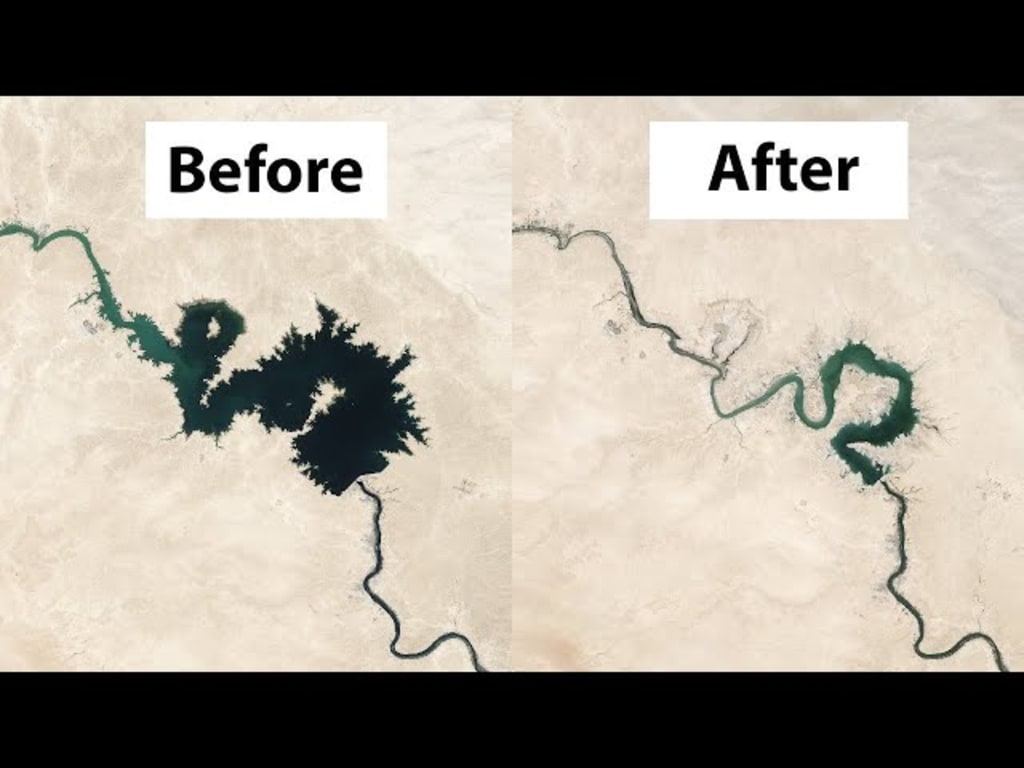River Euphrates Drying Up: How Islam Predicted This Catastrophe
The True Religion

The River Euphrates, one of the world's longest rivers, is drying up at an alarming rate. The river is a vital source of water for millions of people, as well as for agriculture and industry. The drying up of the river is causing a severe water crisis in the region, affecting the lives and livelihoods of people living in Syria, Iraq, Turkey, and Iran. While the reasons for the river's drying up are complex and multifaceted, it is fascinating to note that Islam predicted this catastrophe centuries ago.
The Euphrates River is mentioned multiple times in the Quran, the holy book of Islam. In Surah Al-Kahf (The Cave), Verse 31, the Quran describes the journey of Prophet Dhul-Qarnayn, who traveled to the ends of the earth, where he saw the sun setting in a muddy spring. In Verse 32, he then travels to the opposite end of the earth, where he finds the sun rising on a people who have no shelter from it, except for a canopy. The Quran then goes on to say in Verse 33: "Until, when he reached the setting of the sun, he found it set in a spring of black muddy (or hot) (or turbid) water: And he found near it a people." Some scholars believe that the "spring of black muddy water" referred to in this verse is the Euphrates River.
In another verse, Surah Ar-Ra'd (The Thunder), Verse 4, the Quran says, "And in the earth are tracts (diverse though) neighbouring, and gardens of vines and fields sown with corn, and palm trees - growing out of single roots or otherwise: watered with the same water, yet some of them We make more excellent than others to eat. Behold, verily in these things there are signs for those who understand." This verse emphasizes the importance of water as a crucial resource for agriculture and human sustenance.
The Hadith, the recorded sayings and actions of Prophet Muhammad (PBUH), also references the Euphrates River. According to a Hadith narrated by Sahih Muslim, the Prophet (PBUH) said, "The Hour will not come until the river Euphrates dries up to unveil a mountain of gold." This Hadith is considered authentic and is widely accepted by Muslim scholars. Many Muslims believe that this Hadith is a prediction of the end times and the coming of the apocalypse.
While some may argue that the mention of the Euphrates River in Islamic scripture is merely coincidental, the fact that the river is drying up at an unprecedented rate cannot be ignored. The reasons for the river's drying up are complex and multifaceted, including climate change, mismanagement of water resources, and the construction of dams and irrigation systems.
According to a report by the United Nations Development Programme (UNDP), the Euphrates River is losing around 30 percent of its flow every year. The report also states that the river has become increasingly polluted, which is causing serious health concerns for people who rely on the river for drinking water and agriculture.
Conclusion:
The Quran and the Hadith have provided an accurate description of the Euphrates River, and its mention in Islamic scripture adds a spiritual significance to this environmental crisis. It is a reminder for humanity to take responsibility for their actions and to protect the natural resources that sustain us. The impact of climate change on our planet is not limited to the Euphrates River, and we must take urgent action to mitigate its effects.
It is essential to recognize that the Euphrates River is not just a source of water but a significant part of the cultural and historical heritage of the region. The drying up of the river is not only a threat to human lives but also to the unique ecosystem and the diverse wildlife that depend on it. The impact of the river's drying up will be felt beyond the region, affecting global food security and exacerbating the already existing geopolitical tensions.
The world needs to take collective action to address the issue of water scarcity and climate change. Governments, non-governmental organizations, and individuals must work together to reduce greenhouse gas emissions, implement sustainable water management practices, and develop technologies to help communities adapt to the changing climate. It is crucial to ensure that water resources are managed sustainably and shared equitably, to avoid conflicts and promote regional cooperation.
In conclusion, the drying up of the Euphrates River is not just an environmental crisis, but it is also a spiritual wake-up call for humanity. Islam has provided an accurate prediction of this catastrophe, emphasizing the importance of water as a precious resource for human survival. It is up to us to take action to protect the natural resources that sustain us and ensure a sustainable future for generations to come.
About the Creator
Muhammad Sarib Ali
Sarib is an experienced Content Writer with 5 years of experience in the CNet industry. He is a creative and analytical thinker with a passion for creating high-quality content and crafting compelling stories.
Enjoyed the story? Support the Creator.
Subscribe for free to receive all their stories in your feed. You could also pledge your support or give them a one-off tip, letting them know you appreciate their work.






Comments
There are no comments for this story
Be the first to respond and start the conversation.